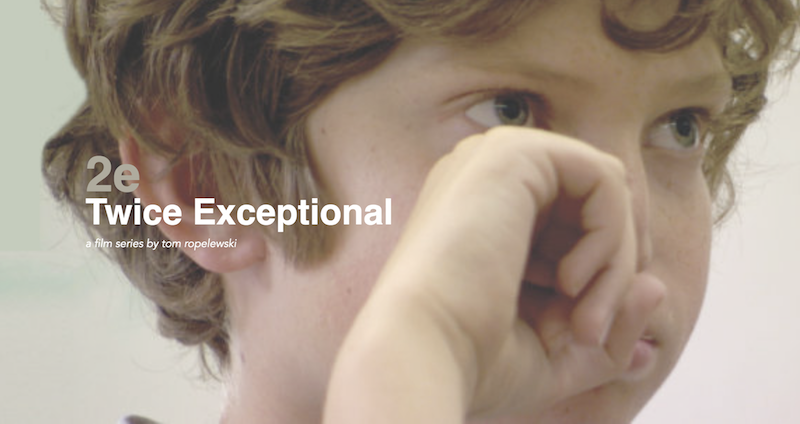2e: Twice Exceptional is a low-budget documentary with heart. There’s nothing fancy about this peek into the lives of twice-exceptional teens, their parents, and their teachers.
But just the existence of this documentary is revolutionary enough.
2e?
The average reader’s first question is obvious: 2e? What’s that? I wrote a long discourse on the topic which you can access here. However, the short answer is that a twice-exceptional child is both gifted and has a disability. That disability could be physical, emotional, neurological. But no matter what the disability, the end result is that the disability often masks the giftedness.

There have been some movies made about 2e people without identifying them as such. The most prominent that comes to mind is My Left Foot, about a child so physically compromised, he couldn’t communicate what was happening in his very active brain. It is a dramatic and beautiful movie.
In contrast, this documentary focuses in on real, everyday teens fighting the battle between their intellect and the issues that compromise their ability to access education, communicate, and achieve. There’s not a lot of drama here, just a clear look at the hard work of supporting these students into adulthood.
What you’ll see
This one-hour documentary is long on direct interviews. Parents explain their journey from thinking they were raising typical kids to being plunged into the chaos of raising a child with special needs. Teachers talk about their experiences working with this difficult, but rewarding, population.
The focus, however, is on the kids themselves. And in this movie, they make a compelling argument for why we need more educational flexibility. Many of these students argue that without their 2e-dedicated school (Bridges Academy in Los Angeles), they would have been lost in a system not equipped to handle them.
The drama centers on Pi Day, when the students compete to memorize Pi to the furthest amount of digits. Punctuated with students struggling to perform the digits they have memorized, we hear from the students themselves about their challenges and their dreams.
Limits exposed
The limits of this documentary mirror our society as a whole. With its dense population and surfeit of wealthy donors, L.A. is the sort of place where such a school can exist. In most places, such as my county where our only school serving 2e students just closed, there is neither the large number of 2e students nor the concentration of wealth to support such a school.
The limits of this documentary point out the limits in our society as a whole. In most places in this country, a 2e student is lucky to get a couple of teachers throughout their school years who understand and connect with them. It’s hard enough for gifted students to find teachers trained in the special needs of giftedness. (Most teacher trainings do not require study of gifted learners.)
But most teachers have absolutely no training in how to serve the needs of gifted students with disabilities.
Awareness is key
Documentaries like this one can help by spreading awareness of these students’ existence, their great potential, and their educational needs. By the end of the movie, it’s clear how much these kids have to offer society. Many similar kids, spread around the world, are not receiving the support they need. They are languishing in special education programs that do not support their academic needs. They are bullied and emotionally harmed by fellow students and teachers in regular education. Their parents are told they need medication and therapy.
The teachers in the documentary make a strong case for an educational approach that is sadly rare in our society: instead of focusing on these students’ deficits, they focus on their strengths and interests. This is messy, complicated education. It’s expensive and the payoff is sometimes not obvious. It’s very hard to quantify.
But when you see these students move past their disabilities as they shine in their abilities, you can see that it’s all worth the trouble.
Learn more:
Visit the film’s homepage to learn more, join their email list, and find out about screenings.













